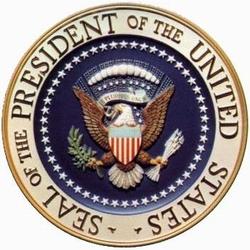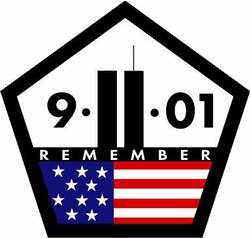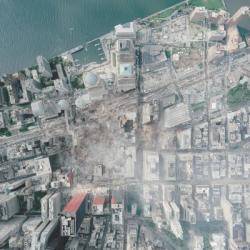"The Threat Is Real"
 President Bush, speaking to
reporters at the White House today, called the threat that al Qaeda
operative might once again try to hijack commercial passenger jets
and turn them into guided suicide weapons, "very real." The
president's remarks came just two days after reports that the TSA
had issued an urgent memo to airlines and law enforcement agencies,
warning of an al Qaeda plot drawn along the same lines as the
September 11th, 2001, attacks.
President Bush, speaking to
reporters at the White House today, called the threat that al Qaeda
operative might once again try to hijack commercial passenger jets
and turn them into guided suicide weapons, "very real." The
president's remarks came just two days after reports that the TSA
had issued an urgent memo to airlines and law enforcement agencies,
warning of an al Qaeda plot drawn along the same lines as the
September 11th, 2001, attacks.
Asked how real is the threat and what can Americans do about it,
this was the president's response:
BUSH: Yeah. Well, first of all, the war on
terror goes on, as I continue to remind people. In other words,
there are still Al Qaida remnants that have designs on America.
The good news is that we are, one, dismantling the Al Qaida
organization and, two, we're learning more information about their
plans as we capture more people.
And the threat is a real threat. It's a threat that--you know,
we obviously don't have specific data. We don't know when, where,
what.
But we do know a couple of things. We do know that Al Qaida
tends to use the methodologies that worked in the past. That's,
kind of, their mindset. And we've got some data that indicates that
they would like to use flights--international flights, for
example.
Now, what we can do is we can be--obviously at home, continue to
be diligent on the inspection process of baggage, as well as making
sure those who board aircraft are properly screened.
 And obviously we're talking to foreign
governments and foreign airlines to indicate to them the reality of
the threat. We're conscious of folks flying--you know, getting
lists of people flying into our country and match them now with a
much improved database. International flights coming into America
must have hardened cockpit doors, which is a positive
development.
And obviously we're talking to foreign
governments and foreign airlines to indicate to them the reality of
the threat. We're conscious of folks flying--you know, getting
lists of people flying into our country and match them now with a
much improved database. International flights coming into America
must have hardened cockpit doors, which is a positive
development.
Being on alert means that we contact all who are responsible,
who've got positions of responsibility. And so we're focusing on
the airline industry right now, and we've got reason to do so. But
I'm confident we will thwart the attempts.
You know, let me talk about Al Qaida just for a second. I made
the statement that we're dismantling senior management, and we are.
Our people have done a really good job of hauling in a lot of the
key operators. Khalid Shaikh Mohammed. Abu Zubaida. Ramzi--Ramzi
alshibh or whatever the guy's name was.
(LAUGHTER)
Sorry, Ramzi, if I got it wrong.
(LAUGHTER)
Binalshibh. Excuse me.
Swift Sword is dead thanks to the Saudis. Abu Bakar (ph) is now
captured by the Saudis.
BUSH: We're dismantling the operating
decision-makers.
We've got more to do. And the American people need to know we're
not stopping. We've got better intelligence gathering, better
intelligence sharing. And we're on the hunt. And we will stay on
the hunt.
The threat that you asked about reminds us that we need to be on
the hunt because the war on terror goes on.
Bush Says "No" To Saudis
 On a related topic, the president told
reports that he has indeed met with Saudi Arabia's foreign
minister, who demanded that the administration declassify 27 or 28
pages of the 9/11 commission's report. The blacked-out pages
supposedly refer to the role of Saudi intelligence operatives in
the 9/11 attacks:
On a related topic, the president told
reports that he has indeed met with Saudi Arabia's foreign
minister, who demanded that the administration declassify 27 or 28
pages of the 9/11 commission's report. The blacked-out pages
supposedly refer to the role of Saudi intelligence operatives in
the 9/11 attacks:
QUESTION: Mr. President, you met yesterday with
the Saudi foreign minister who wants the administration to
declassify these 27 or 28 pages about his government in this report
on 9/11. Many members of Congress, including several Republicans,
say they see nothing, or at least most of the materials in their
view could be made public.
Can you tell us, is there any compromise inside on this? And
could you at least summarize the material in that classified
documents? Is there, as some members of Congress say, material that
you could read and have an incriminating view of the Saudi
government when it comes to 9/11?
BUSH: The foreign minister did come and speak
to me. And I told him this. I said, "We have an ongoing
investigation about what may or may not have taken place prior to
September the 11th. And therefore it is important for us to hold
this information close so that those who are being investigated
aren't alerted."
I also told him in the document that if we were to reveal the
content of the document--by the way, 29 pages of a near-900 page
report--it would reveal sources and methods. By that I mean, it
would show people how we collect information and on whom we're
collecting information, which, in my judgment and in the judgment
of senior law enforcement officials in my administration, would be
harmful on the war against terror.
I just described to you that there is a threat to the United
States. And I also said we're doing a better job of sharing
intelligence and collecting data, so we're able to find--you know,
able to anticipate. And what we really don't want to do, it doesn't
make sense to me--seem like to me--is to reveal those sources and
methods.
Now at some point in time, as we make progress on the
investigation and as the threat to our national security
diminishes, perhaps we can put out the document.
But in my judgment, now is not the time to do so.
And I made that clear to him, and I will be glad--and I'm making
clear to members of Congress.
I want to remind you that, sure, some have spoken out, but
others have agreed with my position, like the chairman of the House
Intelligence Committee. So it's a different point of view.
My point of view, however, since I'm in charge of fighting the
war on
terror, is that I it won't reveal sources and methods that will
compromise our efforts to succeed.
 Aero-News: Quote of the Day (10.23.25)
Aero-News: Quote of the Day (10.23.25) ANN's Daily Aero-Linx (10.23.25)
ANN's Daily Aero-Linx (10.23.25) ANN FAQ: Turn On Post Notifications
ANN FAQ: Turn On Post Notifications Classic Aero-TV: Kitfox Upgrades Back-Country Undercarriage
Classic Aero-TV: Kitfox Upgrades Back-Country Undercarriage Airborne-NextGen 10.21.25: NZ Goes Electric, World Cup UAVs, eAviation Shuttered
Airborne-NextGen 10.21.25: NZ Goes Electric, World Cup UAVs, eAviation Shuttered





